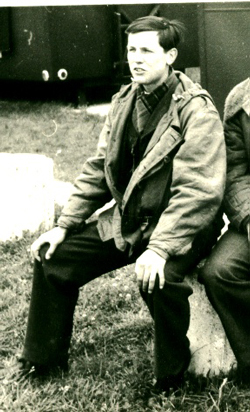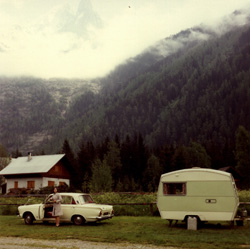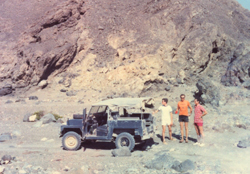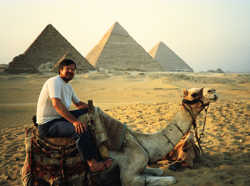After graduation from Halton I was posted with a large crowd of 87th brats to Scampton for the expansion of the V bomber force with the introduction of the Vulcan Mk2. New barrack blocks were still under construction so I found myself in the same room with 40 other corporals in bunk beds and piled lockers. This was not what I had expected on leaving Halton having had my own room! I was initially employed in the Gin Palace (2nd line instrument servicing) with virtually nothing to do: the Vulcan Mk 2 was not yet in service.
We were son given Vulcan training; in late 1960 a crowd of us were bussed every day through Lincoln to Waddington where Vulcan classroom training was carried out. Unfortunately the Vulcan course was for the Mk1 rather than the Mk2 Vulcan so it was not much use for we instrument fitters as the Mk 2 had a different panel of instruments known as the Military Flight System. I did not take much notice of the course, particularly as by that stage I had been accepted for training as a Sgt pilot. So I did not do well in the final exam and for my sins was detached to Waddington for the Vulcan Mk 2 intensive flying trials. The trials which involved working long shifts and a bed in transit accommodation, I was somewhat pissed of with the RAF after Halton; still pilot training awaited.
Finally it was back to RAF Scampton where I was put on 83 squadron. I soon discovered that I was expected to cover Instrument Fitter (Navigation) in addition to my trade as Inst Fitter (General) - so much for the training at Halton. However we soon found that Inst Fitt (Nav) was quite straight forward as if a snag was reported on a particular system you just changed the box. Tony Margetts and I used to have a competition to see who could remove the Air Mileage Unit (AMU) the quickest - it was fixed into the underside of the wing by multiple bolts in a circle. Testing the system afterwards was a bit more problematic, but in fact many systems were not really testable. In those days they did not have the excellent APs which came into service in later years.
The training course for sergeant pilot finally came up in June 1961, but I failed the pre course medical with hay fever which the medic said was sinusitis! So it was back to to being an instrument fitter on 83 sqn. This was quite an enjoyable period although I never managed to get on any of the exotic overseas squadron detachments. The furthest I managed was Lossiemouth by Beverley and on a later trip by Argosy. We sat in the tail boom of the Beverley with a tool box on the floor between us while we played bridge, a game I had learnt in the 1st line squadron crew room and still play today.
 Lossiemouth was the cold war dispersal for four of the Vulcans from 83 sqn; it was still a RNAS base. The RAF were not very welcome there. We were billeted in caravans on the far side of the airfield. After a drunken night out in Buckie we took a short cut across the runway which did not please the Navy! We had already told them at the guardroom to keep their bloody ship steady while we got on board.
Lossiemouth was the cold war dispersal for four of the Vulcans from 83 sqn; it was still a RNAS base. The RAF were not very welcome there. We were billeted in caravans on the far side of the airfield. After a drunken night out in Buckie we took a short cut across the runway which did not please the Navy! We had already told them at the guardroom to keep their bloody ship steady while we got on board.
This was an interesting period on an active squadron. One task I did not like was cleaning the Vulcan aircraft with Wadpol. The aircraft were painted white at that time and had to be kept clean supposedly to reflect the nuclear flash. Down on you hands and knees on the top of a Vulcan wing seemed as though you had an area the size of a dance floor to clean. Of course eventually they were painted in camouflage for low level flight and aircraft washing plants were introduced. All good things come to an end when some idiot in 1963 decided to introduce centralised servicing and I found myself permanently in the hangar. I have never believed that "big is beautiful". It had a big impact on morale.
In 1964, four years after graduation I was promoted to Sergeant and posted to Marham (El Adam with grass as it was known) servicing Valiant aircraft in the hangar. John Voisey was in the same section. There was already a sergeant i/c instruments in the hangar and he did not really need a deputy! I was sent on a Valiant course, which very usefully taught me about basic Navigation Instruments. Regretably after a few months the discovery of main spar cracks resulted in the grounding and scrapping of all Valiant aircraft.
I was posted to Cottesmore on second line servicing (The Gin Palace). They had no need of additional sergeants so I was made NCO IC Oxygen Bay which entailed some very repetitive and boring emergency oxygen bottle servicing (appropriate to an LAC). When I complained about that I was put in the orderly room looking after the files (even more boring). It seemed as though I ought to consider "buying myself out", but as an alternative solution, having been on day release to Lincoln Tech and gained an HNC, I was accepted for officer training in the engineering branch.
After OCTU, my third lot of square bashing in the RAF (after Cosford and Halton), I went on a year long engineering course at Cranwell. This usefully taught me about everything else on the aircraft other than the instrument systems I already knew. There was also lots of "schools". I was impressed with the professional training given. I was posted to Wyton in 1967 as OC Electrical and Instrument Flt.

After a two more tours I finally got my longed for overseas posting - Malta. I should have been posted to 11Group at Stanmore but the post was luckily disestablished a few days before I was due there. Mintoff had earlier kicked out the Brits from Malta, but I was one of the crowd who went back to set up the place again in mid 1972. They told me that there was no accomodation for familes and that I had to go alone and later put in a Callfam. I knew that there was lots of empty accomodation to rent so I said I was bringing my own anyway and set off with family and an old Cortina and small caravan. We had a delightful two week journey through France and Italy. The job in Malta was rather boring but I played lots of rugby in Malta and Cyprus and had an flat by the sea overlooking St Paul's bay. Three years later we took car and caravan on a six weeks journey back to the UK. Good job I had learnt to speak Italian while in Malta as we had lots of car problems (engine core plug leaks).
After Malta I had struck lucky and been posted into an excellent job as Installation Control Officer in the Ground Radio Installation Squadron (GRIS) at RAF Henlow. We had been saving up our local overseas allowance in Malta and had not bought a duty free car (only one allowed in Malta - that was the old Cortina!). So we could afford to buy our first house which was conveniently situated in the village at the back of the Henlow airfield and I could cycle to work.

On GRIS I was responsible for the work of 200 people scattered in teams around the UK and overseas. But I left the day to day running of things to my three very able Flight Sergeants in the Installation Control and spent part of my time visiting the lads in Singapore, Hong Kong, Gan, Masirah (see left), Cyprus, Malta, Germany and Gibraltar as well of course the UK.
Then I had amazing luck when one of my mates (Mike from 84th entry Inst Fitt) was posted in as my boss. We had a good rapport, not that my previous bosses had been a particular problem, but they didn't always understand how Halton brats do things. Mike gave me a Spec Rec for promotion; many years later when I asked why, he told me that it was because I ran the squadron for him.
So I was promoted to Sqn Ldr in 1977 and luck held again when I was posted to MOD signals directorate in London. This meant no house move and an easy commute by train to London paid for by the RAF. It was an interesting job liaising with The RAF at the coalface, the RAF ATC authorities and the MOD Procurement Executive for the specification and purchase of radio/ATC tower communication equipment. I enjoyed working in London. At one time we four chaps in the office set out to visit a different pub every lunch time.
Three years at MOD soon passed. I thought that there was a good likelihood that my next posting would be a boring job at Strike Command. Also I was wanting to put down roots and fancied a change of career. I had been attending technical college and then university gaining management qualifications and learning about industry. So I decided to cash in my chips in late 1980 and take the pension and gratuity offered.

While at the MOD I had been visited by salesmen from industry who seemed to live a fascinating life travelling round the world to exotic places. At the same time they had an interesting job both as an engineer and a salesman. So I joined them and stayed in that career until retirement in my early sixties. By that time had visited very many countries around the world in various jobs selling telecomms, radio. radar and TV system equipment. My last few years were spent selling test equipment for the new digital TV services which was the most satisfying job I had, with tourism,as normal, thrown in free.